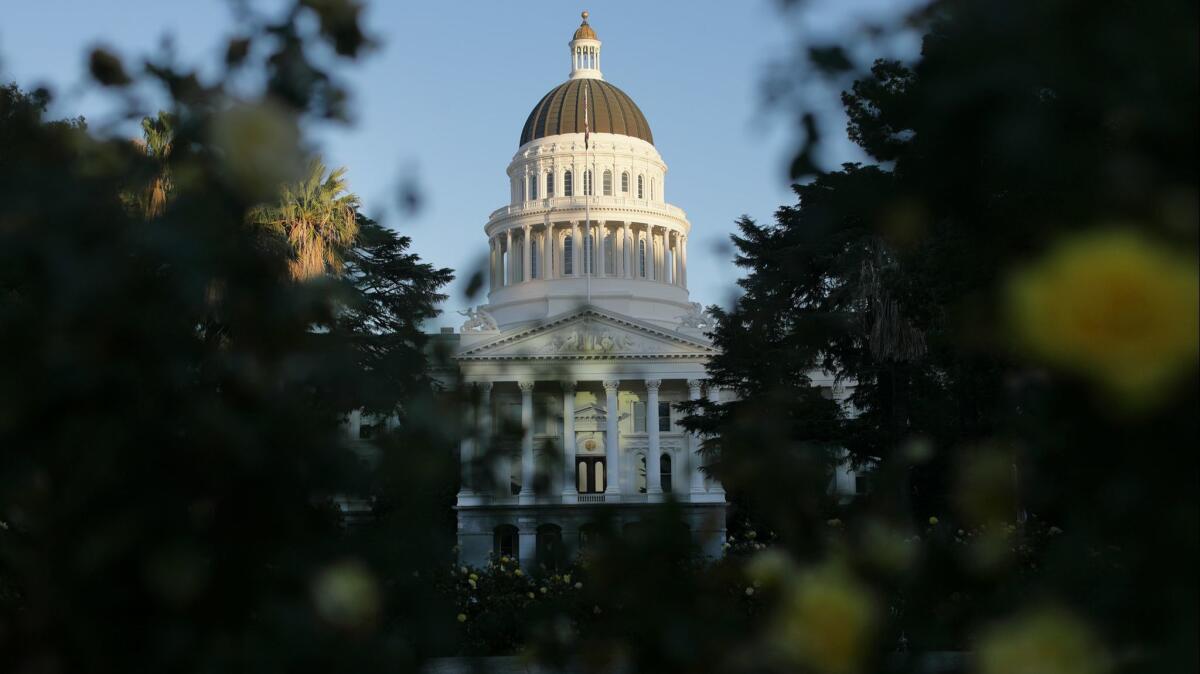Editorial: California’s bad ideas on how to prevent the next college admissions scandal

- Share via
It’s seldom a good thing when California lawmakers go into headline-reactive mode, quickly proposing a new law — or several — in response to a major story that has grabbed the public’s attention. A recently proposed package of legislation inspired by the college admissions scandal is unfortunately another example of how that process can go wrong.
Two of the six bills respond to the fraud itself, in which dozens of parents allegedly rigged college entrance exams or paid bribes to secure spots for their children at exclusive colleges. But because the scandal also brought attention to troubling but legal aspects of college admissions that favor the wealthy and connected, much of the legislation is not aimed at criminal behavior but simply at making the admissions process more equitable.
Unfortunately, some of the bills are unnecessary, others are poorly thought out and one would require the state to interfere in the practices of private organizations in potentially harmful ways.
One bill could have negative consequences for the very students that legislators are trying to help.
One would require three college administrators at the University of California and California State University to check each “admission by exception” before the student is accepted, apparently to root out fraud and dishonesty. These generally are students who might not be accepted for their academic achievements alone but who are considered highly desirable by, say, an athletic coach or a musical director.
But UC already is examining how to tighten its procedures to prevent fraud among these so-called side-door admissions, which add up to 2% of all students accepted. The Legislature would be wiser to let the state’s colleges take a careful look at the situation and come up with their own solutions — because the colleges know their own processes and needs better than legislators do. If their solutions are too weak, it will then be time to talk about state intervention.
Another bill calls on UC and Cal State to review whether and how heavily the SAT and ACT college entrance exams should be weighed in admissions decisions. Nothing wrong with that, but both state college systems already are doing so.
The most problematic of the bills in the package would prohibit all colleges and universities in the state, public or private, from giving preference to applications from the children of alumni — so-called legacy applicants — or the children of donors. Cal Grants, which provide financial aid for students from lower- to middle-income families, would not be given to students who attend schools that refuse to change those policies.
There are several things wrong with this bill. First, the state schools say they don’t give preference to legacy candidates as it is.
As for the private colleges, many have a long history of legacy admissions and, frankly, it’s hard to see a good reason for such policies other than to keep admissions within a privileged club. The colleges don’t appear to gain financially from the preference; the applicants have done nothing to deserve it and it keeps spots from going to more qualified candidates.
But even though the system is ripe for extinction, that’s a policy change that private colleges should be making on their own and in ways that work best both for their institutions and for students.
While it certainly strikes us as odious to see families buy their way into an institution of higher learning, if a donor is willing to spend millions of dollars so that the college can accept and enroll more scholarship students, there’s at least a reasonable argument to be made that the policy occasionally might do more good than harm.
Enter the Fray: First takes on the news of the minute »
Plus, this bill could have negative consequences for the very students that legislators are trying to help. If private colleges decide to keep their existing admissions policies, lower-income students might be unable to attend because they can’t get Cal Grants to help them financially. The Legislature shouldn’t use the financial welfare of needy students as a cudgel for social engineering.
One more bill would require private college consultants, who coach students through the admissions process for what are usually hefty fees, to register with the California secretary of state, who later would propose regulations for the industry. It’s unclear how this would prevent scandals like the current one in which a Newport Beach consultant pleaded guilty to funneling parents’ money into bribes for athletic coaches. It’s already illegal to commit fraud.
College admission is a complicated and nuanced procedure, as well as one that too often favors connected, well-heeled applicants. Legislators appear to be looking for a role to play in a big and shameful story, but if they haven’t thought through what kind of reforms are needed, they’re better off sitting this one out.
Follow the Opinion section on Twitter @latimesopinion and Facebook
More to Read
A cure for the common opinion
Get thought-provoking perspectives with our weekly newsletter.
You may occasionally receive promotional content from the Los Angeles Times.









